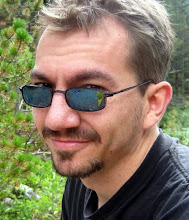 So, some details of Christopher Nolan's final Batman film, The Dark Knight Rises, are coming out. It was just announced that Anne Hathaway will be playing Selena Kyle (aka Catwoman) and Tom Hardy will be playing Bane. At first I was apprehensive about Hathaway in this role. She's got the sweet, girl-next-door appearance which just doesn't scream Catwoman. The more I think about it, though, the more I like it. I'm sure Nolan intends to give the character some sort of origin story so we'll get to see her go from a relatively normal girl with a rough upbringing to a brash anti-hero. I think Hathaway can pull this off.
So, some details of Christopher Nolan's final Batman film, The Dark Knight Rises, are coming out. It was just announced that Anne Hathaway will be playing Selena Kyle (aka Catwoman) and Tom Hardy will be playing Bane. At first I was apprehensive about Hathaway in this role. She's got the sweet, girl-next-door appearance which just doesn't scream Catwoman. The more I think about it, though, the more I like it. I'm sure Nolan intends to give the character some sort of origin story so we'll get to see her go from a relatively normal girl with a rough upbringing to a brash anti-hero. I think Hathaway can pull this off.
It's also very interesting that Nolan has chosen Bane to be the primary antagonist. If you're not really sure who he is, check out this overview of his history from io9. Basically, his most famous moment is breaking Batman's back after releasing every villain in Arkham Asylum in order to wear Batman down. In many ways, he could be considered the dark side of Bruce Wayne - driven, intelligent, supremely skilled - and I imagine this is how Nolan will write him.
All in all, I'm very excited for this movie and this announcement only makes me more confident that Nolan will end it all in style.
Thursday, January 20, 2011
Batman Update
Posted by
Captain Noble
at
8:54 PM
0
comments
![]()
Labels: Anne Hathaway, Batman, Comic Book Movies, Tom Hardy
Wednesday, January 19, 2011
What Should Bystanders Do?
 NPR had a story about witnesses to brutal events and how they react.
NPR had a story about witnesses to brutal events and how they react.
I remember when one of my step-daughters and I were watching a news story unfold together. It was about a lawyer, shot outside of a courthouse by a disgruntled former client as a news cameraman, who just happened to be there, captured the whole thing on tape. My step-daughter, who is a doctor and whose father is a lawyer who may or may not have a disgruntled client some day, was disgusted by this. “Why doesn't he help him?” she kept asking me. I had an answer: He was doing something by recording the scene. But that hardly seemed adequate, and that is exactly how I feel about what went on in that Washington Metro train station.
There is an answer, but it seems inadequate.
The title of the story is "The Dilemma of the Bystander," but it doesn't seem to me like it should be much of a dilemma. Why wouldn't someone witnessing someone being harmed do something? It doesn't always have to be jumping in (although that's great). Just calling the cops or someone else nearby to help would be better than just watching or doing nothing.
Perhaps my understanding of these situations is colored by an experience I had when I was young. I was in fifth-grade (I think) when I witnessed a group of kids my age ganging up on my younger brother after school in an attempt to at the very least push him around a bit if not anything more serious. Did I step in to help him? Nope. I was too scared. I was used to getting picked on and pushed around and the last thing I wanted was more of that. So I just stood there. Luckily our dad was there and he put a stop to it.
I think about that a lot and wish I would have stepped in. It's easier for me to think that now, though, since I've developed the self-confidence to better handle those situations. It helps that part of my job now is dealing with big scary people (try restraining a 6'6", 300 lb. college football player some time) and so I've had some practice. Even with my past, though, I struggle to see how someone could watch someone getting throttled (or worse) and not do something. Like I said, call the cops, get someone else nearby to help. Something.
The question of whether or not to help someone in need, especially in the face of harm, should never be a dilemma.
Posted by
Captain Noble
at
8:47 PM
2
comments
![]()
Labels: Bystanders, Dilemmas, Helping Your Fellow Humans
Monday, January 17, 2011
DNA Exonerates Innocent Man. Again.
 How many times is this going to happen before people really get upset about it? A Texas man has been freed after spending thirty years in prison.
How many times is this going to happen before people really get upset about it? A Texas man has been freed after spending thirty years in prison.
DNA test results that came back barely a week after Cornelius Dupree Jr. was paroled in July excluded him as the person who attacked a Dallas woman in 1979, prosecutors said Monday. Dupree was just 20 when he was sentenced to 75 years in prison in 1980.
Now 51, he has spent more time wrongly imprisoned than any DNA exoneree in Texas, which has freed 41 wrongly convicted inmates through DNA since 2001 — more than any other state.
Ben Franklin said it was better for one-hundred guilty men to go free than for one innocent person to suffer. Our tough-on-crime laws have led to far too many situations like this. No one wants to feel unsafe and politicians suffer no repercussions for calling for harsher and harsher punishments. Likewise, prosecutors rarely face punishment for misconduct. This is not justice. This is weaving the illusion of having done something to protect people, to mete justice.
It's a travesty. These stories should be generating a national conversation over how they can be prevented. Unfortunately most people seem to shrug their shoulders.
Posted by
Captain Noble
at
9:22 PM
0
comments
![]()
Labels: DNA Evidence, Wrongful Convictions
Sunday, January 16, 2011
A Mother vs. Her Fetus
Doctors vote for the fetus which results in the death of both.
In a case that's both tragic and absolutely maddening, a series of Polish doctors allowed a pregnant woman to die from a colon condition because they feared that treatment would threaten her fetus. Edyta (a pseudonym adopted to protect the family) was two months pregnant when she was diagnosed with a painful colon disease that was aggravated by her pregnancy. She searched for a doctor who would treat her condition, and was repeatedly refused; eventually her illness worsened until she miscarried and died.
What a sad, sad story and a perfect illustration of how blind adherence to a doctrine can lead to bad consequences. I don't see how any pro-lifer could think this is an acceptable outcome. I completely understand the desire to not harm a fetus, but this fetus was killed because doctors were worried about harming it. That doesn't mean I think this was an easy, black and white case. I do think that when these events come up, doctors need to keep in mind that they have two patients - the mother and the fetus. Addressing these matters is tricky, but that's why hospitals have ethics committees, so that messy situations can be hashed out and the best possible path forward found. Surely a better outcome than this could have been found.
Posted by
Captain Noble
at
6:49 PM
1 comments
![]()
Labels: Ethical Dilemmas
Subscribe to:
Comments (Atom)



